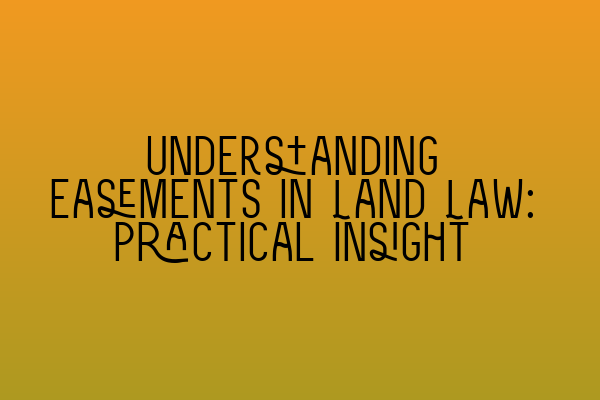Understanding Easements in Land Law: Practical Insight
As a solicitor specializing in property and land law, it is crucial to have a comprehensive understanding of easements. Easements play a vital role in property transactions and can greatly impact the rights and obligations of property owners. In this blog post, we will dive into easements, providing you with practical insights and shedding light on their importance in the realm of land law.
To start, let’s define what an easement actually is. In simple terms, an easement is a legal right that allows one party to use or access another party’s land for a specific purpose. This right typically benefits the holder of the easement and is attached to a particular piece of land, rather than to an individual. Easements can vary in nature, scope, and duration, and may include rights such as access, drainage, parking, or the right to lay and maintain utilities.
Now that we have a basic understanding of what an easement entails, let’s explore some practical insights into how easements work in real-world scenarios.
1. Creation of Easements:
Easements can be created in various ways, including express grant, implied grant, prescription, or necessity. An express grant occurs when the owner of the dominant land expressly grants the easement to the owner of the servient land. On the other hand, an implied grant may arise when the parties’ intentions can be reasonably inferred from their conduct or the nature of the property. Easements by prescription can be acquired through long-term, continuous, and uninterrupted use, while easements by necessity are created when there is no other reasonable means of accessing the dominant land.
2. Types of Easements:
Easements can take many forms and serve different purposes. Some common types of easements include right of way (allowing access over a neighboring property), rights of light (preserving access to natural light), rights of support (prevent a neighboring structure from collapsing), and rights of drainage (allowing drainage of water onto another property). Each type of easement carries its own set of conditions and legal requirements, making it essential to understand their specific provisions and implications.
3. Easements and Property Transactions:
Easements can significantly impact property transactions, and it is crucial to consider their existence and implications when buying or selling land. The presence of an easement can affect the value of the property, the potential use of the land, and the buyer’s ongoing rights and obligations. As a solicitor, it is essential to conduct thorough due diligence to identify any existing easements and ensure that they are properly documented and registered.
4. Easements and Disputes:
Easements are not immune to disputes, and conflicts may arise between the parties involved. Common disputes include disagreements over the extent of the easement’s use, maintenance responsibilities, interference with the dominant land, or changes in circumstances leading to an easement’s extinguishment. In such situations, it is paramount to understand the legal remedies available, including negotiation, mediation, or litigation, to resolve the dispute in a manner that protects the interests of your client.
By now, you should have a clearer understanding of easements and their practical implications in the realm of land law. Easements are complex legal concepts that require attention to detail and a thorough understanding of the relevant legislation and case law. As a solicitor specializing in property law, it is crucial to stay up to date with the latest developments in this area and ensure that your clients are well-informed and protected.
If you’re preparing for the SQE 1 exam and want to test your knowledge of property law and land law, be sure to check out our SQE 1 Practice Exam Questions. These practice questions will help you gauge your understanding and identify areas for further study.
For those looking for comprehensive preparation for the SQE 1 and SQE 2 exams, our SQE preparation courses are designed to provide you with the knowledge and skills you need to succeed. Don’t forget to check out the SQE 1 Preparation Courses and SQE 2 Preparation Courses we offer to enhance your exam readiness.
Lastly, it is crucial to stay informed about the SRA SQE Exam Dates to ensure you plan your studies effectively and are well-prepared for the upcoming exams.
At SQE Property Law & Land Law, we understand the importance of easements and their impact on property transactions and disputes. Our team of experienced solicitors is dedicated to providing expert advice and practical insights to ensure that our clients navigate the complexities of easements and land law with confidence.
If you require assistance with easements or any other property law matters, please don’t hesitate to Contact Us. Our team is ready to assist you with professional and personalized legal services.
Remember, understanding easements is vital in the world of land law, and by familiarizing yourself with the different aspects and implications, you can effectively navigate the complexities of property transactions and disputes. Stay informed, stay prepared, and stay ahead in the ever-evolving field of land law.
